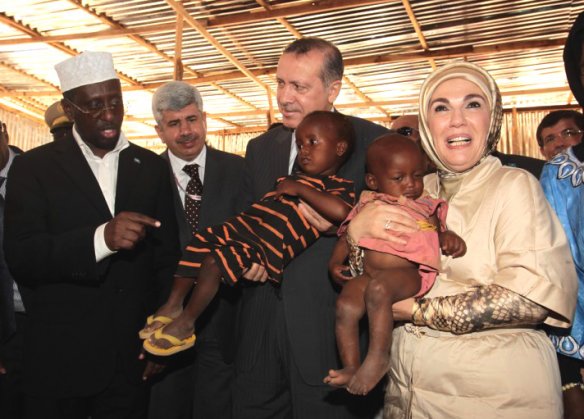
Turkish PM visits Somali camp. Photo: Worldbulletin.net
In August 2011 Turkish Prime Minister Erdoğan took his family, his foreign minister, and an entourage of cabinet members to visit Somalia as part of a humanitarian mission to highlight the plight of 12 million Somali victims of drought. The visit was symbolically important, as Erdoğan travelled to Mogadishu, the first visit to the Somali capital by a leader from outside Africa in 20 years. Also symbolic was the timing, coming as it did during the holy month of Ramadan in which Turkey alone raised 201 million USD in humanitarian relief. The magnitude of the Somali tragedy – with the UN reporting that 3.2 million people at risk – deserves significant international attention, but even so, one can wonder what is behind the Turkish fervor to engage with Africa?
The question is relevant because the modern republic has not traditionally had a significant engagement with Africa. While Turkish Islamic charities such as the IHH (Foundation for Human Rights and freedoms and Humanitarian Relief) have been working in Africa since the mid 1990s, it is under the AKP that several first time visits by Turkish leaders have taken place. In February 2009, President Gül was the first Turkish President to visit Tanzania, then Kenya. Likewise in March 2010, Gül, travelled to Cameroon and Congo – notably accompanied by 140 Turkish businessmen. These visits highlight both economic but also political interest in Africa. Turkey’s decision to declare 2005 “the year of Africa” helped secure it a seat on the UN Security Council with all but one African country voting in its favour.
In part, Turkey’s African opening fits well with Foreign Minister Davutoğlu’s policy of multi-regionalism and strategic depth. Under the AKP, and despite its half-hearted protests, Turkey has both become a model for the Arab world (with some degree of success) and a mediator (with considerably less success). Above all, Erdoğan, as a firebrand for the Palestinian cause, has secured a position for himself as a regional leader to be reckoned with.
However, it would seem that the regional box is too small for Turkish ambitions. Davutoğlu aims for a Turkey that is a key international player, aspiring to the much coveted title of ‘emerging power’. A first indication of this ambition was the partnership with Brazil in attempting to find a resolution to the Iranian nuclear issue in May 2010, a diplomatic disappointment that nonetheless, elevated Turkey’s status to that of an emerging power. Building its reputation as a humanitarian donor in Africa can contribute to this perception of Turkey.
According to Davutoğlu, Turkey’s strategic depth – its cultural, religious and historical past coupled with its democracy – is the basis of its ‘soft power’. The AKP intends to extend its already considerable soft power beyond the Middle East to serve as a model for Africa’s Muslims. From the African perspective, large civilian engineering ventures such as the Suleja-Kaduna Motorway in Northern Nigeria and the Al-Halfaia Bridge in Sudan, are generating interest in the Turkish model. These are coupled with cultural projects such as the Midrand Mosque Complex in South Africa. As well as being the largest mosque complex, it is also the first model of Ottoman architecture in the Southern hemisphere and is built on the donations from a single, rather wealthy, conservative Turkish businessman – a follower of the Turkish charismatic Islamic cleric Fetullah Gülen.
In many ways, Turkey’s interest in Africa is based on the same economic rationale that has driven its engagement with the Middle East – the need for new markets for its “Anatolian tigers”. These small-and medium-sized entrepreneurs from Turkey’s conservative heartland have benefitted greatly from the AKP’s reputation in the Middle East and are now looking towards Africa. Given the shaky economies of the EU, this is a wise strategy. Particularly since the EU still remains Turkey’s main trade partner, despite the increase in regional trade. Turkey’s African focus is supported by IMF figures that note that seven of the world’s 10 largest growing economies are in Africa. Turkey’s own trade with the continent has grown more than four times since 2002.
In the field of humanitarianism, Turkey’s role as an emerging donor in Africa will be followed with interest at a time when the humanitarian field will also feel the financial squeeze. To what extent will humanitarian policy be a stepping stone for business interests and diplomatic profiling? Turkey’s role in Africa presents an even more complicated “chicken-and-egg” dilemma: Is Turkey using its soft power, and in particular its religious identity, to promote business interests or are business interests being used to promote an ideology – a Turkish understanding of Islam?
This blog post was first published November 4, 2011 on the New Middle East Blog
An updated text on Turkey’s new humanitarian approach in Somalia can be found in this NOREF policy brief.